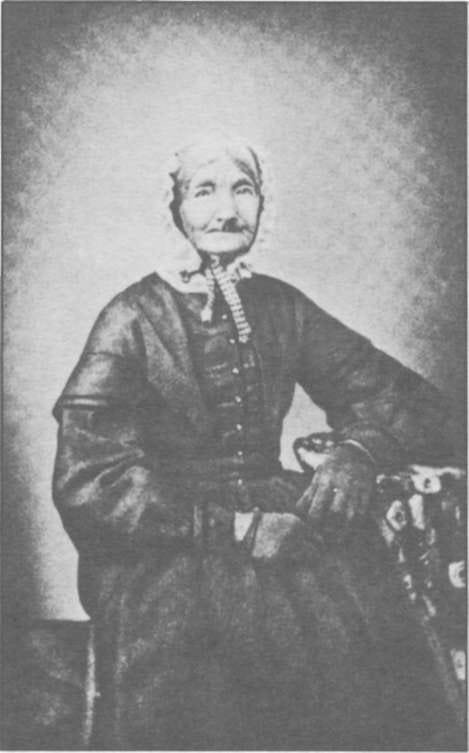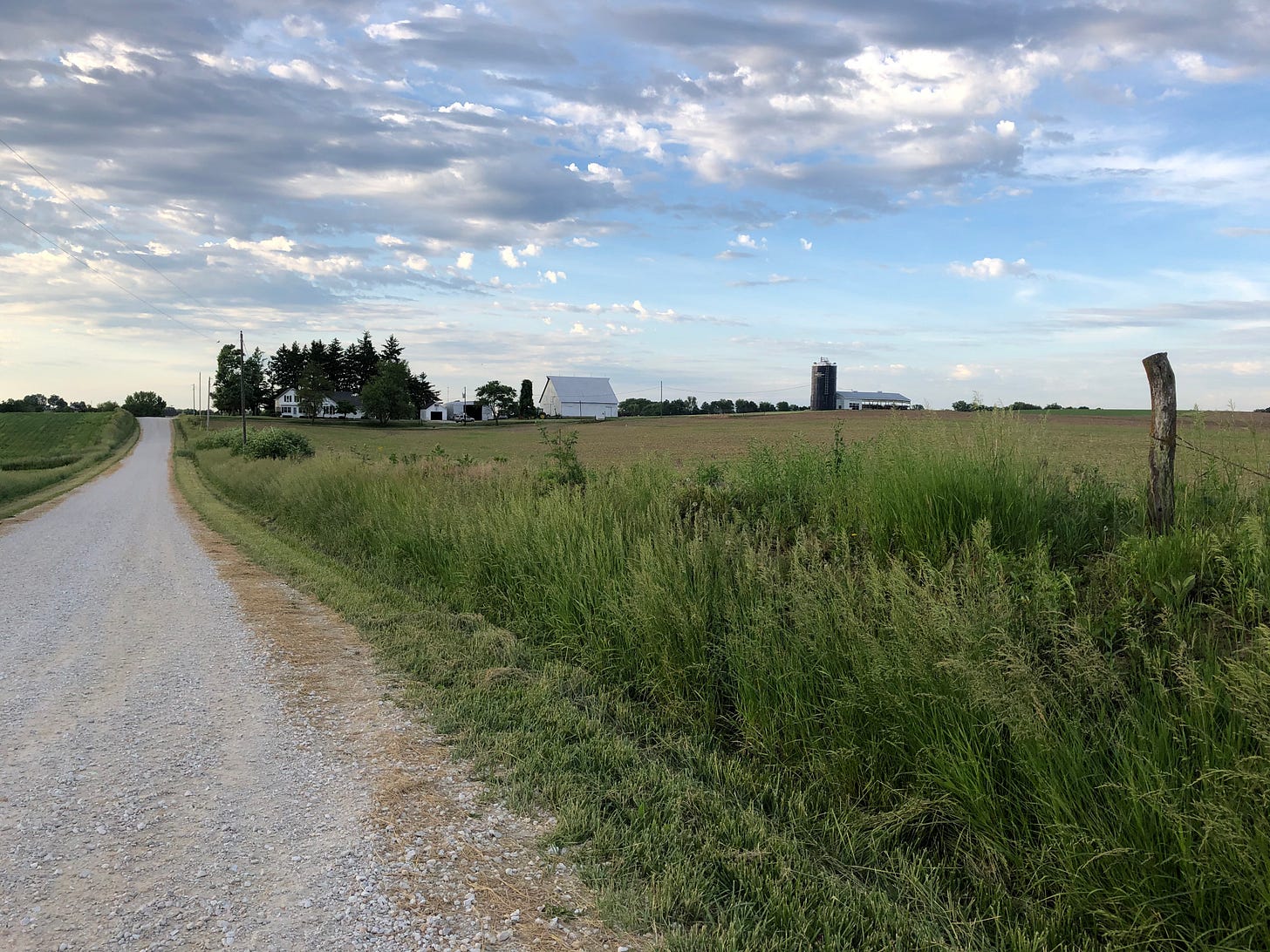From Whence One Comes
An Essay Written in Honor of the Bicentennial Anniversary of Pike County, IL
Dear Reader,
Today is my 50th birthday.
Unlike previous birthdays when I’ve regularly deactivated my Facebook page and generally hidden from people, you’ll have to forgive me this time for indulging myself and taking advantage of the fact that February 5 falls on a Friday, the publishing day for Second Drafts. In honor of the convergence, here’s the history that my 50 years of life is built upon.
Lest you think I had all this planned, I didn’t. I recently entered an essay as part of the Pike County Historical Society’s contest and celebration of Pike County’s bicentennial anniversary. The criteria was to “write about anything relating to Pike County, past or present,” and the Society offered prizes for the different age groups (junior high, high school, college, and adult). On Sunday, January 31—the official date that the Illinois General Assembly made Pike a county 200 years ago in 1821—the Society’s essay committee announced that yours truly took first place in the adult category (don’t be too impressed: there were only five entries).
I’d like to say thanks to the Society for sponsoring the contest, to my aunt, Janice (Dunham) Barton, for her genealogy help, and to my parents, Roger and Charlotte, for bringing me into the world 50 years ago today. Oh, and happy birthday to my third-born, Katie, with whom I share this birthday and who will always be the best birthday present ever.
As always, thanks for reading.
Craig
From Whence One Comes: An Essay Written in Honor of the Bicentennial Anniversary of Pike County, IL
Most of us tend or have been taught to think of “place” as a geographical concept having to do with maps and meridians, longitudes and latitudes. But “place” has emotional and spiritual meaning as well—factors that go far beyond what mere atlases can capture. Because each of us is a product and a person of our environments, all of us recognize that “place” means more than just a dot on a map or a satellite picture from Google Earth; “place” includes everything—events, meanings, sentiment—that make up the culture and character of our life’s geography and our history made there.
I’m fascinated by the fact that what separates me from previous generations is simply one day passing after another, over and over again, until days become months, months become years, years become decades, decades become centuries, and so on. Time is both a massive and a minuscule gap across which to transcend, as it is nothing more (or is it nothing less?) than an enormous accumulation of the minutes of our very existence. As time so accumulates, so does the importance of our family—not just physically, but emotionally, relationally, and spiritually as well—by the addition (and the multiplication) of each generation’s endowment to its lines.
As a long-ago geography major/history minor (1) writing about the 200th anniversary of Pike County, I think about all of this in the way that I was trained—with consideration of context, people, story, and with an eye for detail that goes beyond just geographic coordinates and historical names and dates. The most interesting question for me that has always helped inform my studies of a particular place has been, “Did the land influence the people or did the people influence the land?”
In thinking about Pike County, the answer, of course, is a resounding “yes.”
First Lady of Pike County
If there is a First Lady of my Illinois homeland, she arguably is Rebecca Burlend —English immigrant, prairie pioneer, farming wife and mother, author, and my great-, great-, great-, great-grandmother on my father’s side.
I first learned about Lady Rebecca in Mr. Ken Stauffer’s history class as an 8th grader at Griggsville Junior High School. Her 1848 book, A True Picture of Emigration (2), detailed the Burlend family’s (3) 1831 migration from Yorkshire, England, by way of a two-months-long voyage across the Atlantic Ocean on the vessel Home bound for New Orleans; a 12-day, 1,300-mile journey up the Mississippi River to St. Louis; and a final 120 miles by way of the Illinois River to the gateway of Pike County at the time, Phillips Ferry, just south of present-day Valley City. (4)
As if the trials of the Burlends’ 7,000-mile trek to the very vicinity my then-13-year-old self occupied wasn’t mind-blowing enough, the possibility of my bloodline connecting to theirs was. It was my fellow classmate, Carol Lisa (Curry) O’Brien who first clued me in to our shared heritage, when she declared before God and everybody our distant but definite relation to Rebecca.
I was as happy about the potential as I was horrified by it (anticipated taunts of “kissing cousins,” etc.), but our classmates were merciful, as they were also possibly intrigued by the idea of someone “famous” – she had her own book!—being connected to three (5) classmates along with Pike County’s past. Still, I had to know if the claim was true.
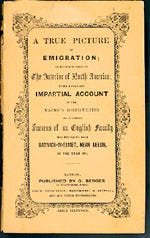
It was my Aunt Janice (Dunham) Barton—she, the authoritative keeper of Dunham family history (may her name be praised)—who verified that, indeed, Rebecca’s son, William, married his wife, Elizabeth Bickerdike (6), who gave birth to Rebecca Ann, who married Charles Birch, whose daughter Celia Louise married A.J. Sargent, whose daughter Carolyn Louise was my father Roger’s mother; thus, Rebecca Burlend was my great-, great-, great-, great-grandmother, making Carol Lisa (also by way of William’s offspring, but through a different sibling) and I seventh cousins (a fact she still teases me about to this day, i.e. “Hey, Cuz.”).
If having a First Lady in one’s lineage doesn’t make an 8th grade boy walk a little taller, it at least gave this one the first meaningful connection to an honest-to-goodness, found-in-a-book historical person and place of his own. Sure, there were other regional possibilities (7), but Rebecca was family, which got me a little more interested in the rest of mine.
The Deacon and the Dunhams
For my last name to be what it is, obviously, it was not just the Burlends who emigrated from England to Pike County. While the number of those bearing the Dunham moniker can seem legion, my particular line arrived in America when John Dunham (1589-1668) a Separatist (8) from Bedfordshire, England, fled religious persecution by first emigrating to Leiden, Holland, and then across the Atlantic to the Plymouth Colony in Massachusetts.
Records indicate that “Deacon John” (as he was known) was set to be on the initial voyage of The Mayflower with William Brewster and William Bradford in 1620, but due to the death of his first wife, Susanna, around that time, he probably ended up coming over later with his second wife, Abigail, and another group of Leiden Separatists in 1629, either on the ship The Handmaid or as independent travelers. (9)
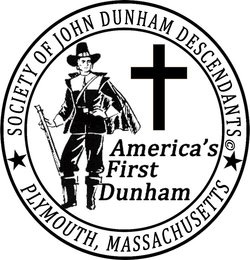
Plying his trade as a weaver as he did in Leiden, John acquired a herd of sheep and some cattle before being appointed in 1633 or 1634 as a deacon under Elder William Brewster in the Church of Plymouth, a post he would hold until his death. (10) In 1639, Deacon John was elected by the colonists to serve as deputy of the General Court of Plymouth and must have done a good job, as he was annually re-elected for the next 25 years. (11) On March 1, 1668, Deacon John Dunham died in Massachusetts at the age of 80, the record of his death noting that he was “an approved servant of God, and a useful man in his place.” (12)
In the 150 years following his death, three main lines of lineage went out from Deacon John and his family—one went up into Canada; another stayed in the vicinity of the east coast; and a third came west. Thus, it was in 1845—one year before Rebecca’s one trip back to England for three months in the summer of 1846 (13)—that the first of my Dunham family arrived in the county of Pike, settling ten miles due west of the Illinois River in what would become New Salem Township.
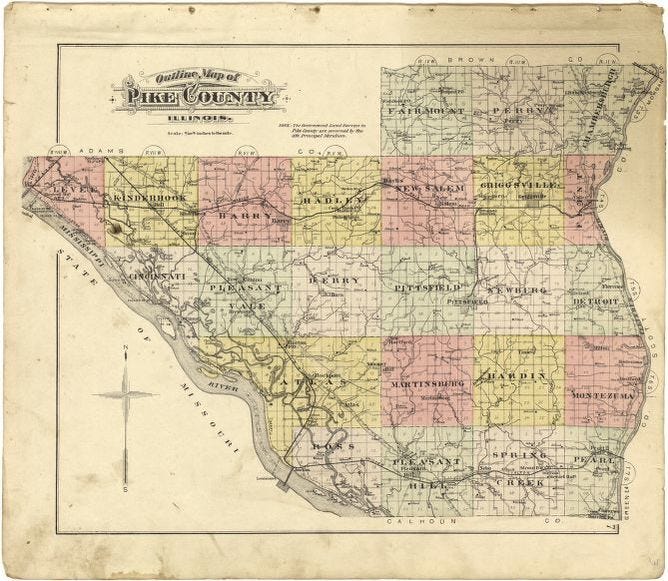
William Dunham, son of Lewis (a Revolutionary War veteran), was born in Maryland and was the first Dunham (of my line, at least) to set foot in Pike County along with his wife, Mary Ann (Polly) Chaney. They became parents of Abel, who married Rachel Harden and had Joseph, who married Eldora Koontz and became parents of Samuel Kyle. Kyle (as he went by) married Rachel Mink and brought my grandfather Dean into the world, then married Carolyn Sargent (daughter of A.J. from above, which ties us to the Burlend clan), with my father, Roger (and the aforementioned Janice) coming on the scene a few years later.
Living in the Absence of the Dead
Author Wendell Berry (14) writes of rural living (and dying) in the fictional town of Port William, Kentucky. In my favorite novel of his, Hannah Coulter, Hannah learns the context of her life:
“I began to know my story then. Like everybody’s, it was going to be the story of living in the absence of the dead. What is the thread that holds it all together? Grief, I thought for a while. And grief is there sure enough, just about all the way through...But grief is not a force and has no power to hold. You only bear it. Love is what carries you, for it is always there, even in the dark, or most in the dark, but shining out at times like gold stitches in a piece of embroidery.” (Hannah Coulter, 51)
Like Hannah, I grew up in the absence of the dead as well: William and Mary Ann and Abel and Rachel are buried in Swiggett Cemetery northeast of New Salem; Joseph and Eldora, along with Kyle and Rachel and Dean and Carolyn are buried in West Cemetery in Pittsfield. That’s five generations of Dunhams buried within a 10-mile radius of the Pike County farm our family has called home for the past 176 years—the same place my parents, Roger and Charlotte, live to this day.
As I came to appreciate when I left home at 18, in terms of knowing and understanding from whence one comes, “living in the absence of the dead” doesn’t get much more tangible than that. (15)
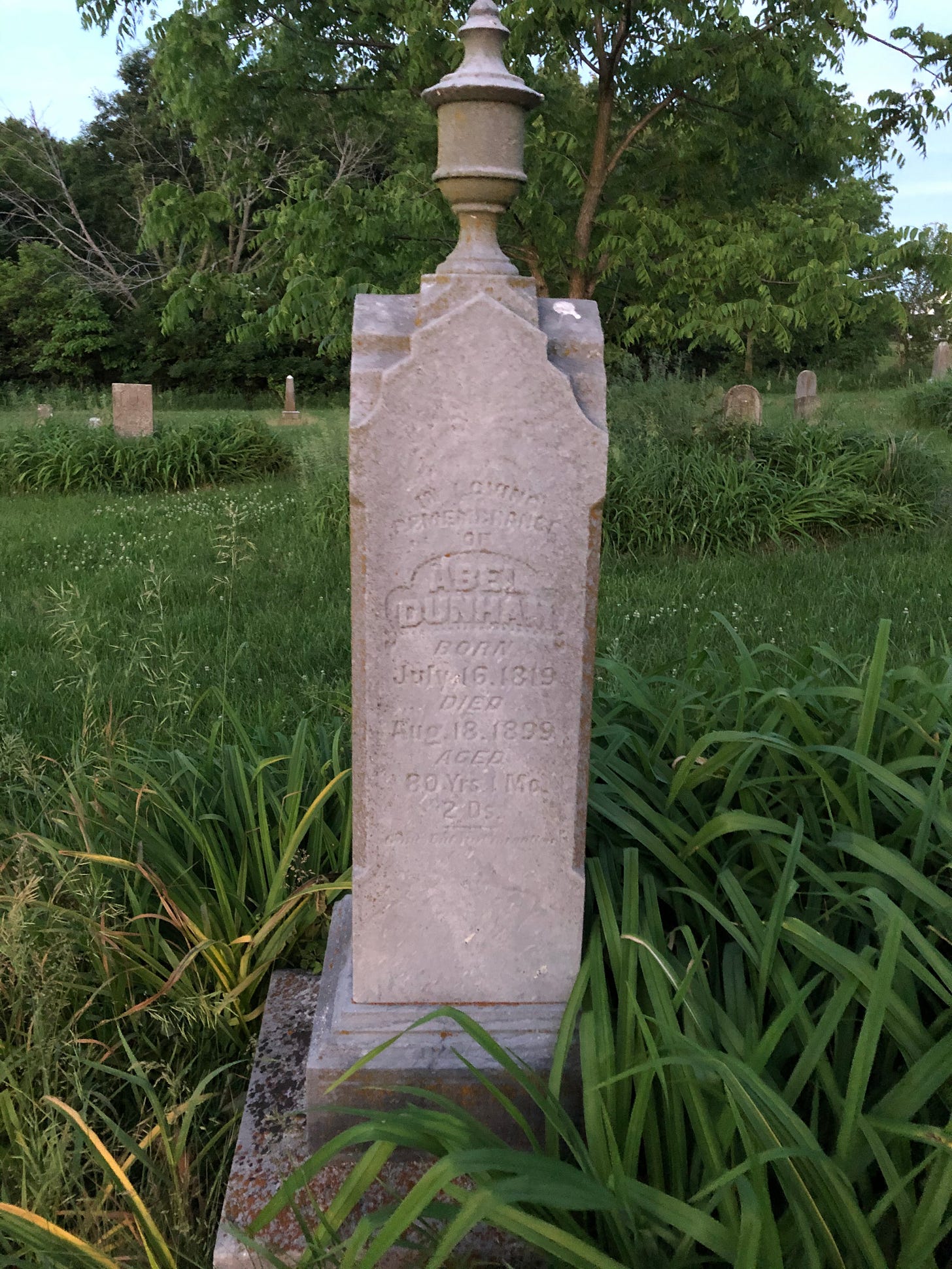
An Affinity for the Rural Life
Despite not having lived there since 1989, I love Pike County; our four daughters have always loved being and connecting with their four Pike County cousins (my two younger sisters, Jamie and Jill, and their husbands each have two kids of their own); my wife, Megan, has graciously tolerated countless tales about Pike Countians whom she has never met; and even our dog, Peaches, has seemed to have an affinity for the rural life (in particular the John Deere Gator rides).
For as long as I can remember, Pike County has meant much to me as a place, an anchor, a stopping-off point, a means of provision, a muse of creativity, a farm, a home…the list is endless. The stability of associating myself with these particular 831 square miles of God’s green earth is hard to come by in today’s transient world and mesmerizes me for its value, both felt and perceived. Even when I didn’t want to be in Pike County, I always loved it...and I always will.
But then I ask myself, do I love Pike County, or do I love the idea of Pike County? The answer to both questions is “yes,” which transforms the inquiry into one of degrees (i.e. which one do I love more?). That’s when things get confusing. There was a time when, for instance, I would “plow” the living room floor with my toy tractors for hours on end as a five-year-old, and I’m sure my family may have expected me to remain on or eventually return to the farm.
At some point, though—exactly when, I don't know—they let go of that expectation, most likely because at some point—again, exactly when, I don’t know—so did I. I remember being 16 and chomping at the bit to leave for college, to graduate and move to The Loop in downtown Chicago (to do what, I had no idea), and to never look back. The desire did not spring from some dislike for the rural as much as a fascination with the urban; after all, as the post-WWI song goes, “How you gonna keep ‘em down on the farm after they’ve seen Paree?” (16)
To my parents’ credit, I can’t say I ever felt immense pressure to be only about the farm; chores (what little of them I had) never came before studies or school events, and farming was never cause for missing a game or performance or church as long as Saturday mornings were kept open for hog work. If anything, there were times in my early teens when I probably felt frustrated that I couldn’t do more to help out in the fields or on the bigger equipment in a more significant way, but God had his reasons, and my folks—perhaps seeing the writing on the wall even before I did—acquiesced to those by supporting (and at times, directing) me in other endeavors.

Stretching the Most Lasting Bands
As I've grown older, I confess that my pride in telling others of Pike County and our family’s seven-generation farm quickly erodes even before the end of the sentence when, inevitably, I know the next question that’s coming: “So what’s going to happen to it?” Many times I have felt guilty at being the only son or (though I would not trade any of my daughters for all the farms in the world) that my Y chromosomes couldn’t figure things out enough to produce a male heir to carry on the Dunham name and take to farming more than I did. Neither feeling is fair, but guilt (in particular the self-inflicted kind) does not play by the rules.
As much as the thought of returning to Pike County can be nostalgically attractive, I've yet to figure out how to make it happen practically; honestly, it would seem I have little of what it takes to “make it” in the country. While the urbanite wrongly assumes those living in “flyover country” and outside the city limits are somehow “less than” because they haven’t “made it” in/to the city, he would never survive—not in the long-term—in rural America, which is why he doesn’t try beyond buying a minuscule weekend/vacation acreage upon which his existence does not depend.
When I think of my father and my grandfather, I think of Thomas Jefferson's words:
“Cultivators of the earth are the most valuable citizens. They are the most vigorous, the most independent, the most virtuous, and they are tied to their country and wedded to its liberty and interests by the most lasting bands.” (17)
To be sure, Jefferson’s sentiment describes both men; it does not, however, seem to describe me, a truth that at times grieves my heart and disturbs my thoughts. There is no solution or salve for this affliction, save only the choice to still care for what my progenitors did and still visit the land to which they gave their lives. Both actions seem trite compared to the efforts of my forebears in sustaining this land the past 176 years, but it’s what I can do, so I’m glad to do it.
As predominant a sculptor as any in my life, Pike County—as a tool in the sovereign hands of God—strangely seems to have shaped me for something other than itself; it’s no secret I’m grateful for the hewing and chiseling of my youth, but that I have moved away saddens me nonetheless. Since turning 18 (and despite periodic returns to the Midwest for a myriad of reasons), I’ve continued the western quest of my ancestors, living a third of my life along the Rocky Mountains (12 years in Colorado, 5-plus now in Montana) and in a variety of vocations. (18)
I like to imagine I have some of the adventurous blood (though probably not the same “stuff”) in me that Rebecca and Deacon John had as they made their ways to America. I hope I’ve worn the Dunham name (at least our line of it (19)) as they would have hoped when they first thought about emigration for the good of future generations. Hard work was all they could offer and hold onto—hard work and faith, for they sought to walk with God, as do I. (20) Berry again captures this rural reality so well:
“We lived here by our work. Our life and our work were not the same thing maybe, but they were close. The children would grow up knowing how to work, and would have the satisfaction of knowing they were useful. But the foremost reason was we needed their help. From the earliest time they were able to help, we gave them little jobs to do. Sometimes when we expected and required them to do it, work was what they thought it was. Sometimes when we were all at work together, they thought they were playing, but even so work was what it was and they were helping. We were at work, and sometimes hard at work, the year round. By our work we kept and improved our place, and in return for our work the place gave us back our life. The children knew this. For a long time this was the knowledge they most belonged to.” (Hannah Coulter, 89)
In similar knowledge of Pike County—of this place and of these people to which I most (and still) belong even in my physical distance away—it is not hard to answer the question, “Did the land influence the people or did the people influence the land?”
The answer, of course, is a resounding “yes.”
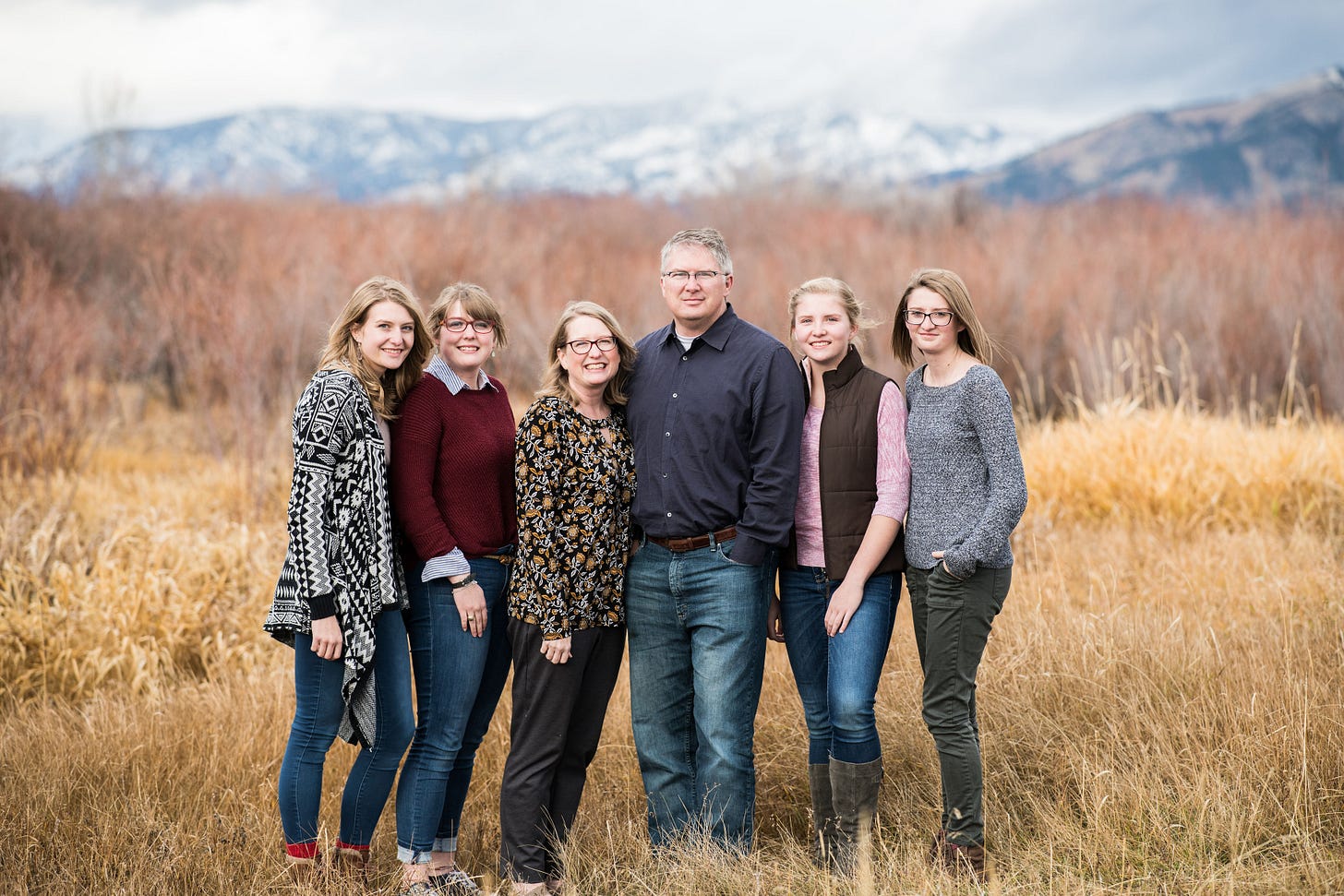
Footnotes
(1) It’s true: degree courtesy of the University of Missouri-Columbia, 1993. Our motto: “Geography: it’s everywhere.”
(2) As was the practice of the day, book titles were more elaborate than they are now, the full name being, A True Picture of Emigration: Or Fourteen Years in the Interior of North America; Being a Full and Impartial Account of the Various Difficulties and Ultimate Success of an English Family Who Emigrated from Barwick-in-Elmet, Near Leeds, in the Year 1831.
(3) According to Midwestern historian and editor M.M. Quaife writing in A True Picture of Emigration, “The author and her husband had fourteen children in all. Four had died in England before the migration to America, and two more (Edward, the ‘eldest son’ and Mary, the ‘eldest daughter’ of the present sentence) remained behind. The five children who shared in the family migration were John, then nine years old, Hannah, eight years old, Sarah, three years old, Charlotte, and William an infant.” (9)
(4) According to Quaife, “The farm which the immigrants…obtained for their home is legally known as the northeast ¼ of the northeast ¼ of Section 6 Twp. 5 S, R. 2 W. of the Fourth P.M. It lies about two miles east of Bethel Cemetery, and about three miles north of the village of Detroit, in northwestern Detroit Township. Three miles to the northeast lies Valley City, formerly Phillip’s Ferry.” (57) It should be noted, however, that Valley City was never Phillip’s Ferry as Quaife alludes; the town was actually built 2-3 miles northeast of it.
(5) The other relative in our class was Robyn Burlend, whose family line inherited the surname. I was only slightly jealous.
(6) According to Quaife, “Charles Bickerdike, the first of his name to settle in Pike County, came to America (and Illinois) and settled in Flint Township, Pike County, about 1828. It was the reading of his letters to his brother in England which determined the migration of the Burlends.” (8)
(7) The reader will recall an eventually well-known author who, as a boy named Samuel Clemens, settled with his family along the Mississippi River across from Pike County not long after Rebecca settled to the west of the Illinois with hers.
(8) “Separatists believed the Church of England was so corrupt that they would have nothing to do with its worship, teachings or structure. Puritans, by contrast, believed in reforming, or ‘purifying,’ the Church of England from within. For Separatists to hold their own worship services was against the law; the 1559 Act of Uniformity required all citizens to attend Church of England services, with fines imposed for every Sunday and holy day they were absent from services. To attend an unofficial service was to risk even larger fines and possible imprisonment.”
(9) “If the Dunhams were not in the 1629 group, they came shortly after, as their son Jonathan was born about 1631 in Plymouth.
(10-12) http://stoltzfamily.us/2010/07/06/a-godly-well-esteemed-deacon
(13) Rebecca wrote her travelogue with the assistance of her son and scribe, the author and teacher Edward Burlend, during this return visit to England in 1846. According to Edward, “(Rebecca) returned (to Pike County) after a stay in England of about three months, taking with her the daughter (Mary) mentioned at the first outset as being left, the husband of the same, and their two children, besides a family or two of connections.” (157)
(14) If there is a literary voice that captures Pike County for me—even as he writes of his own rural Kentucky—it is Wendell Berry’s. Even more so than Clemens, who grew up just across the Mississippi, Berry’s fiction, nonfiction, and poetry of rural life are given to the quiet, generational rhymes and rhythms of this land and people between the rivers.
(15) I’m reminded of what Midwestern songwriter/poet Rich Mullins wrote in his song, “Boy Like Me/Man Like You”:
“And did they tell you stories 'bout the saints of old, stories about their faith?
They say stories like that make a boy grow bold, stories like that make a man walk straight.”
(16) “Paree,” otherwise known as “Paris.”
(17) Letter to John Jay, 23 August 1785.
(18) So far, the list includes college student, camp director, conference center director, rock star, author, seminarian, junior varsity baseball coach, high school teacher, headmaster, high-tech administrator, and Bible college instructor.
(19) My Grandmother (Carolyn) Dunham once told me that she was just glad that we didn’t have any “scoundrels” to speak of in our family, to which I replied that I was still alive. In her 95-year-old way, she paused and looked concerned.
(20) Both sets of records for Rebecca and Deacon John include strong testimonies of faith in God through Jesus Christ.
Why Subscribe?
Why not? Second Drafts is a once-a-week newsletter delivered to your inbox (you can also read it online or through your RSS reader) and it’s totally free.)
Keep Connected
You’re welcome to follow me on Twitter.



